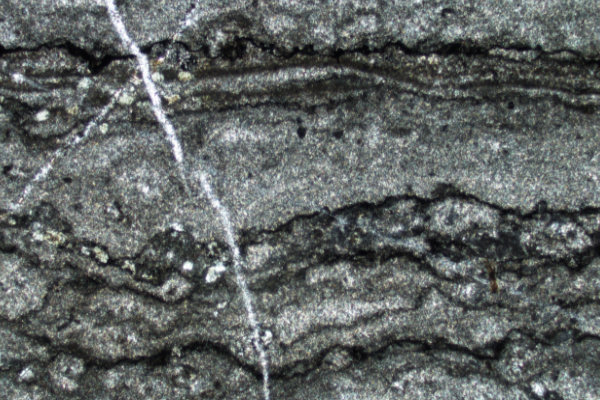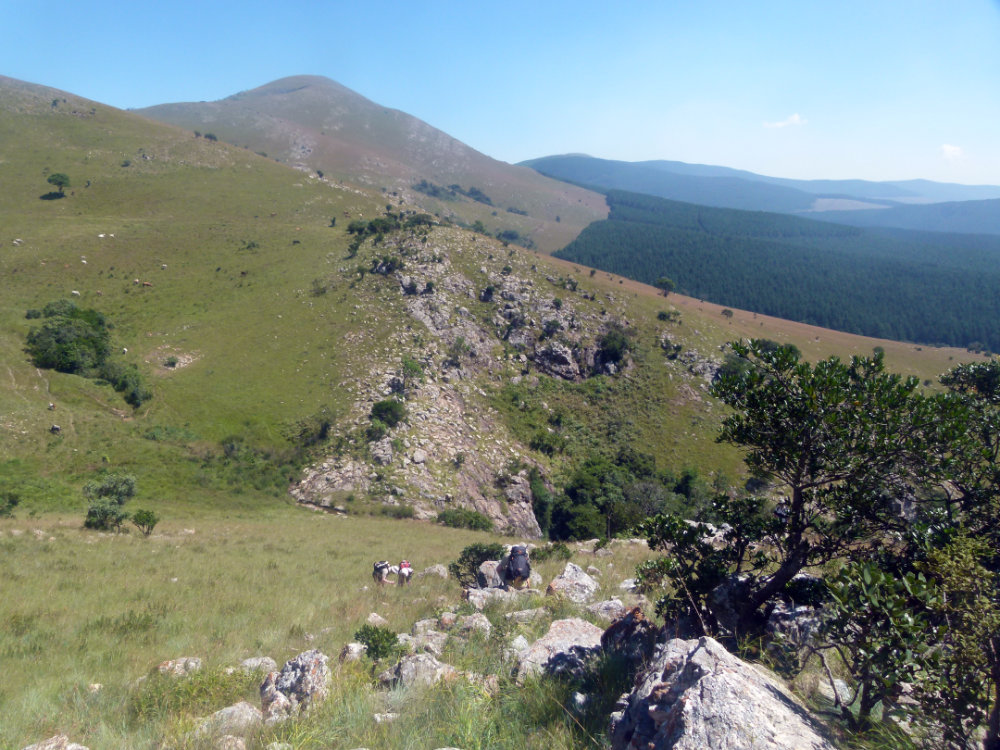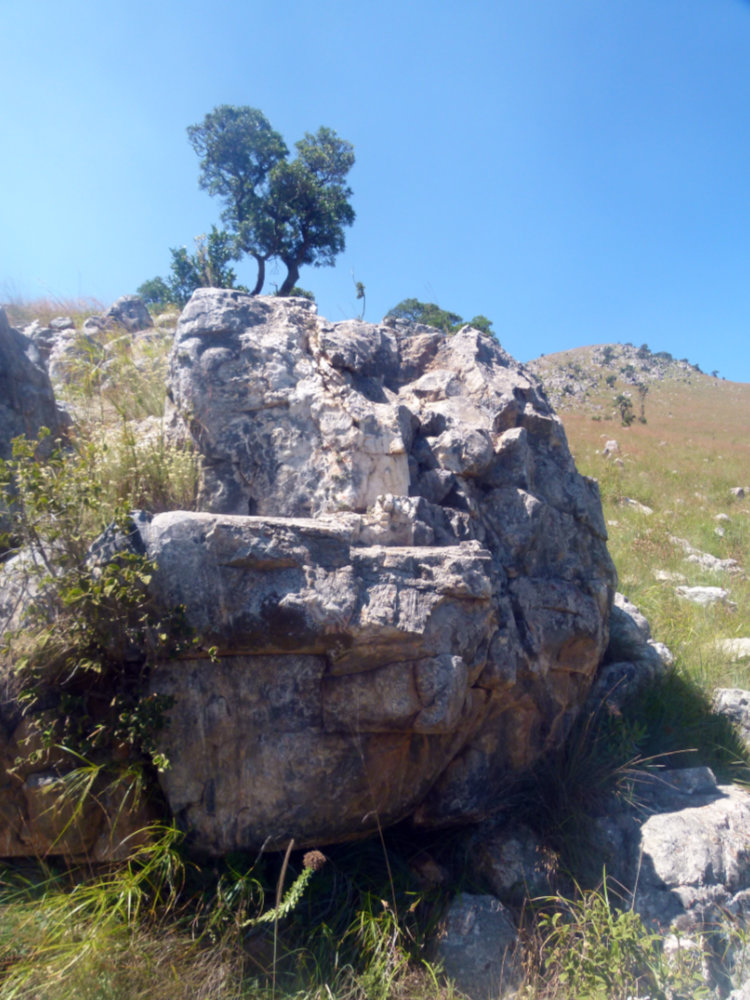Alice Pellerin PhD thesis
 The early nitrogen biogeochemical cycle: insights into the temporality and routes of Earth’s oxygenation
The early nitrogen biogeochemical cycle: insights into the temporality and routes of Earth’s oxygenation
Started in october 2020
Funding: doctoral grant
Supervisor: Christophe Thomazo (Biogéosciences) ; cosupervisor: Magali Ader (IPGP)
Defended the 30 may 2024
Abstract
 My PhD work explores the transition from an anoxic to an oxygenated ocean during the Archean (4.0-2.5 billion years ago, Ga). It aims at gaining some insights into the temporality, modalities and drivers of oceanic oxygenation, using the nitrogen isotopic signature preserved in sedimentary rocks (δ15Nsed), a proxy of the ocean’s redox state and the joint evolution of the biosphere. By targeting three study sites aged from 3.4 to 2.5 Ga and representative of different depositional environments, the data presented in this thesis improves our understanding of the N-biogeochemical cycle dynamics in three key contexts. The Buck Reef Chert sedimentary deposit (3.4 Ga, South Africa) is one of the first records of nitrogen cycle dynamics in anoxic and ferruginous conditions, representative of many early Archean oceanic/sedimentary environments. The Serra Sul Formation (2.7 Ga, Brazil) highlights the production of oxygen by oxygenic photosynthesis more than 200 million years before the Great Oxidation Event (~2.4 Ga). Finally, the carbonates of the Malmani Subgroup (2.5 Ga, South Africa), show that preferential niches for the development of the first aerobic ecosystems are not necessarily representative of global water column oxygenation.
My PhD work explores the transition from an anoxic to an oxygenated ocean during the Archean (4.0-2.5 billion years ago, Ga). It aims at gaining some insights into the temporality, modalities and drivers of oceanic oxygenation, using the nitrogen isotopic signature preserved in sedimentary rocks (δ15Nsed), a proxy of the ocean’s redox state and the joint evolution of the biosphere. By targeting three study sites aged from 3.4 to 2.5 Ga and representative of different depositional environments, the data presented in this thesis improves our understanding of the N-biogeochemical cycle dynamics in three key contexts. The Buck Reef Chert sedimentary deposit (3.4 Ga, South Africa) is one of the first records of nitrogen cycle dynamics in anoxic and ferruginous conditions, representative of many early Archean oceanic/sedimentary environments. The Serra Sul Formation (2.7 Ga, Brazil) highlights the production of oxygen by oxygenic photosynthesis more than 200 million years before the Great Oxidation Event (~2.4 Ga). Finally, the carbonates of the Malmani Subgroup (2.5 Ga, South Africa), show that preferential niches for the development of the first aerobic ecosystems are not necessarily representative of global water column oxygenation.
 Overall, this work confirms that nitrogen isotopes provide a powerful tool to record both global ocean oxygenation and local biological processes. Nevertheless, it identifies gaps in current interpretations of the nitrogen isotope signature, and proposes a framework including lithology, metamorphism and organic matter carbon isotopes to guide its future interpretation in terms of paleoenvironments’ oxygenation.
Overall, this work confirms that nitrogen isotopes provide a powerful tool to record both global ocean oxygenation and local biological processes. Nevertheless, it identifies gaps in current interpretations of the nitrogen isotope signature, and proposes a framework including lithology, metamorphism and organic matter carbon isotopes to guide its future interpretation in terms of paleoenvironments’ oxygenation.
Keywords
geochemistry, Early Earth, nitrogen isotopes, Archean, oxygenation, sedimentary rocks
Thesis advisory panel
Pierre Cartigny (IPGP)
Jean-François Deconinck (Biogéosciences)
Jury
Eva E. Stuëken, University of St Andrews – reviewer
Kevin Lepot, université de Lille – reviewer
Emmanuelle Vennin, université de Bourgogne – examiner
Daniele L. Pinti, université du Québec à Montréal – examiner
Pierre Cartigny, université Paris Cité – examiner
Christophe Thomazo, université de Bourgogne – supervisor
Magali Ader, université Paris Cité – cosupervisor
Pascal Philippot, université de Montpellier – invited
- extrait:
- lien_externe:
- titre:
- Le cycle biogéochimique précoce de l’azote : approche géochimique élémentaire et isotopique
- date_de_debut_these:
- octobre 2020
- nom:
- Pellerin
- date_de_debut_these_numerique:
- 202010
- kc_data:
- a:8:{i:0;s:0:"";s:4:"mode";s:0:"";s:3:"css";s:0:"";s:9:"max_width";s:0:"";s:7:"classes";s:0:"";s:9:"thumbnail";s:0:"";s:9:"collapsed";s:0:"";s:9:"optimized";s:0:"";}
- kc_raw_content:
 The early nitrogen biogeochemical cycle: insights into the temporality and routes of Earth’s oxygenation
The early nitrogen biogeochemical cycle: insights into the temporality and routes of Earth’s oxygenationStarted in october 2020
Funding: doctoral grant
Supervisor: Christophe Thomazo (Biogéosciences) ; cosupervisor: Magali Ader (IPGP)
Defended the 30 may 2024
Abstract
 My PhD work explores the transition from an anoxic to an oxygenated ocean during the Archean (4.0-2.5 billion years ago, Ga). It aims at gaining some insights into the temporality, modalities and drivers of oceanic oxygenation, using the nitrogen isotopic signature preserved in sedimentary rocks (δ15Nsed), a proxy of the ocean’s redox state and the joint evolution of the biosphere. By targeting three study sites aged from 3.4 to 2.5 Ga and representative of different depositional environments, the data presented in this thesis improves our understanding of the N-biogeochemical cycle dynamics in three key contexts. The Buck Reef Chert sedimentary deposit (3.4 Ga, South Africa) is one of the first records of nitrogen cycle dynamics in anoxic and ferruginous conditions, representative of many early Archean oceanic/sedimentary environments. The Serra Sul Formation (2.7 Ga, Brazil) highlights the production of oxygen by oxygenic photosynthesis more than 200 million years before the Great Oxidation Event (~2.4 Ga). Finally, the carbonates of the Malmani Subgroup (2.5 Ga, South Africa), show that preferential niches for the development of the first aerobic ecosystems are not necessarily representative of global water column oxygenation.
My PhD work explores the transition from an anoxic to an oxygenated ocean during the Archean (4.0-2.5 billion years ago, Ga). It aims at gaining some insights into the temporality, modalities and drivers of oceanic oxygenation, using the nitrogen isotopic signature preserved in sedimentary rocks (δ15Nsed), a proxy of the ocean’s redox state and the joint evolution of the biosphere. By targeting three study sites aged from 3.4 to 2.5 Ga and representative of different depositional environments, the data presented in this thesis improves our understanding of the N-biogeochemical cycle dynamics in three key contexts. The Buck Reef Chert sedimentary deposit (3.4 Ga, South Africa) is one of the first records of nitrogen cycle dynamics in anoxic and ferruginous conditions, representative of many early Archean oceanic/sedimentary environments. The Serra Sul Formation (2.7 Ga, Brazil) highlights the production of oxygen by oxygenic photosynthesis more than 200 million years before the Great Oxidation Event (~2.4 Ga). Finally, the carbonates of the Malmani Subgroup (2.5 Ga, South Africa), show that preferential niches for the development of the first aerobic ecosystems are not necessarily representative of global water column oxygenation. Overall, this work confirms that nitrogen isotopes provide a powerful tool to record both global ocean oxygenation and local biological processes. Nevertheless, it identifies gaps in current interpretations of the nitrogen isotope signature, and proposes a framework including lithology, metamorphism and organic matter carbon isotopes to guide its future interpretation in terms of paleoenvironments’ oxygenation.
Overall, this work confirms that nitrogen isotopes provide a powerful tool to record both global ocean oxygenation and local biological processes. Nevertheless, it identifies gaps in current interpretations of the nitrogen isotope signature, and proposes a framework including lithology, metamorphism and organic matter carbon isotopes to guide its future interpretation in terms of paleoenvironments’ oxygenation.Keywords
geochemistry, Early Earth, nitrogen isotopes, Archean, oxygenation, sedimentary rocks
Thesis advisory panel
Pierre Cartigny (IPGP)
Jean-François Deconinck (Biogéosciences)Jury
Eva E. Stuëken, University of St Andrews – reviewer
Kevin Lepot, université de Lille – reviewer
Emmanuelle Vennin, université de Bourgogne – examiner
Daniele L. Pinti, université du Québec à Montréal – examiner
Pierre Cartigny, université Paris Cité – examiner
Christophe Thomazo, université de Bourgogne - supervisor
Magali Ader, université Paris Cité - cosupervisor
Pascal Philippot, université de Montpellier - invited
